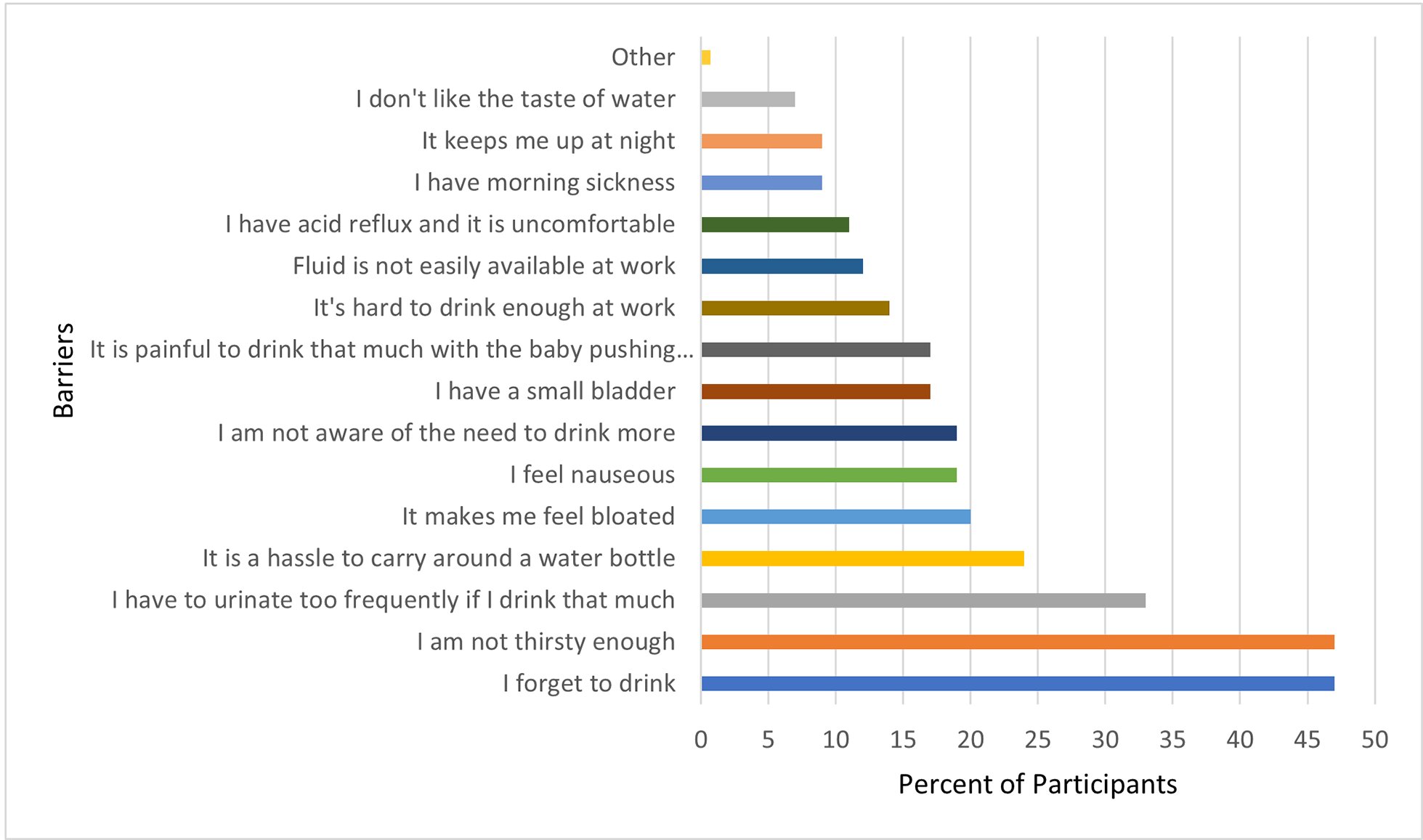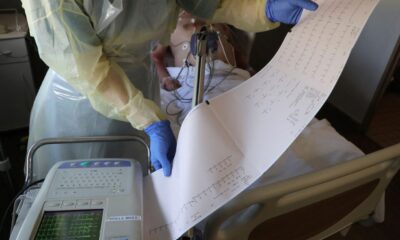Health
Pregnant women may not drink enough water, researchers report

Barriers to meeting fluid intake guidelines (N = 137). Credit: PLOS Digital Health (2024). DOI: 10.1371/journal.pdig.0000499
Maternal underhydration during pregnancy is associated with a range of negative birth outcomes, including low levels of adequate amniotic fluid and plasma, impaired fetal brain development and the risk of low birth weight, according to guidelines from the American Pregnancy Association and The American College of Obstetricians and Gynecologists.
An interdisciplinary research team from the Penn State College of Health and Human Development recently found that despite the risk, many pregnant women in the United States do not know how much water to consume and do not track their water intake.
However, the survey also indicated that women were willing to follow guidelines and use digital technology that could help them track their hydration status and achieve water consumption goals.
According to national guidelines, pregnant women should consume between 1.9 and three liters of water every day. The recommendations for individual women vary based on the women’s weight, how far along they are in their pregnancy, their physical activity level and even the climate in which they live.
Danielle Symons Downs, professor of kinesiology and obstetrics and gynecology, and Abigail Pauley, a postdoctoral researcher in Downs’ research group, led a study of 137 pregnant women in the United States.
Results of their research – recently published in PLOS Digital Health– showed that almost two-thirds of women were not following and/or were unaware of hydration recommendations. About the same percentage of women said they were interested in using digital tools to increase their fluid intake.
“Pregnant women don’t need to panic about hydration, but it is important to consume enough fluids,” says Downs, deputy director of the Penn State Social Science Research Institute.
“Hydration is important for the health of both the mother and fetus, especially as pregnancy progresses into the second and third trimesters, when women need more water to form amniotic fluid, transport nutrients and improve digestion. Our previous work has also shown that hydration levels can influence the birth weight of the fetus.”
Study participants were recruited on social media from across the United States. Participating pregnant women completed a one-time 45-minute survey about their water intake and related water intake behavior. Results showed that 63% of women were unaware of hydration guidelines and 67% did not meet recommendations.
When asked why they might not be drinking enough water, the most common answers included lack of thirst, forgetting to drink water and not wanting to urinate more often.
“Overall, these results highlight a gap in the messaging we provide to pregnant women and in the awareness of expectant mothers,” Pauley said. “Fortunately, our other results showed that for many women there could be a cheap and low-impact way to address the problem.”
According to the researchers, women in the study were open to using digital technology to improve their water intake. Sixty-nine percent said they were willing to use a digital tool, and 67% said a smart water bottle – a water bottle that measures the amount of water consumed during a day and passes that data to a smartphone app for tracking – could help they meet fluid intake guidelines.
“Our collaborator, David Conroy, conducted a study that successfully used smart water bottles to boost fluid intake in people with kidney stones, which led us to consider this approach in pregnant women,” Downs said. “The results of both that study and this research suggest that smart water bottles may be an effective tool for promoting water intake among pregnant women.”
Pauley said she was also optimistic.
“People love the Stanley Cup craze,” Pauley said. “A smart water bottle can be seen as novel and fun to use to increase fluid intake. The pregnant women in our study were very receptive to the idea.”
Despite the knowledge that maternal underhydration can negatively impact fetal growth, little data has been collected to date on the specific risks to pregnant women of not meeting hydration guidelines. The current research is part of Downs’ larger Healthy Mom Zone study, which is developing a personalized, digital intervention that adapts to the needs of each pregnant woman.
Downs said the Healthy Mom Zone team plans to measure how much impact hydration levels have on the health of mothers and fetuses as part of a future study.
“The United States has the highest birth and death rates of any high-income country in the world,” Downs said. “We are building the tools that will help us better understand why that is true and provide strategies to address important gaps to improve birth outcomes for women and babies.”
More information:
Abigail M. Pauley et al., Every Sip Counts: Understanding Hydration Behavior and User Acceptability of Digital Aids to Promote Adequate Intake During Early and Late Pregnancy, PLOS Digital Health (2024). DOI: 10.1371/journal.pdig.0000499
Quote: Pregnant women may not drink enough water, researchers report (2024, August 13) retrieved August 13, 2024 from https://medicalxpress.com/news/2024-08-pregnant-women.html
This document is copyrighted. Except for fair dealing purposes for the purpose of private study or research, no part may be reproduced without written permission. The content is provided for informational purposes only.













